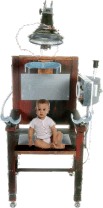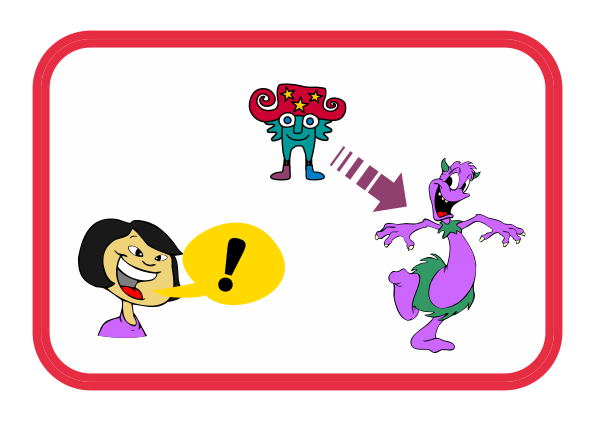
Intelligence is not all that important in the exercise of power, and is often, in point of fact, useless.
Henry Kissinger
Be A Monster!

very active
chaotic
choice
Procedure:
Students tell the teacher to be things and the teacher obliges. Eg, "Be a monster!" "Be a zombie!" That's it! Play until everyone is tired, or the teacher is...
It's useful to have a partner who can tell the teacher to be themselves - "Be - [name]" This means the students have to keep using language and also they can use this as an "out" if the monster gets close. Without a partner an idea is to invent a kind of transformation movement so one can become oneself again within the spirit of the game. Or set a timer for a short time so that when it goes the monster is gone.
Original Notes
When teaching young children I like to use monster games. Most children love to have 'scary feelings' but some don't. It is important to respect the rights of those children who don't want to play. Often they enjoy watching more.
To begin with I teach two control words - Stop! and Don't!. I work with a helper so we can avoid using Japanese. Stop! can be taught by moving or dancing to music and cutting the music and shouting Stop! Freeze dramatically and the students soon get the idea. Then get the students to start shouting stop as well. As for Don't! I take advantage of Japanese culture and usually teach this using a pair of outdoor shoes. I teach the class in socks or barefoot and at some point notice the indoor shoes the students are all wearing. I say, "You've got shoes!" I then pretend to put on the pair of outdoor shoes. The children know this is wrong and start telling me in Japanese. It's then easy to get them to use the word Don't!. I then get a pair of indoor shoes tucking the outdoor shoes under my arm. I make it look difficult to hold all the shoes. Then I can play at putting the wrong shoes on. Gradually I get one indoor shoe on and eventually the other. All the time the students say Don't! when I try to put on an outdoor shoe. If you are in a country which doesn't have a strong sense about not wearing outdoor shoes inside then you'll need another method.
I teach Don't! and Stop! so that the children have the language to control the game. The game is very simple. The children take turns to say "Be a.....". We usually start with cat. My helper says "Be a cat." and I become a cat. Be a dog and I become a dog. Be a monster and I become a monster. As a monster I usually move slowly, deliberately and noisily. Children enjoy being chased and it's fun for them if they can just escape. If the students are more confident or older I move a little quicker. Usually one of them learns how to say "Be a fast monster". One of my favourites from a five-year-old was "Be a clock monster!" And this is the deep point of the game to get the students to manipulate the language for themselves.
Of course it is possible for students to play the game with each other but of course children like to see an adult being silly - and even more so controlling how the adult is silly. This game is very popular and is good for burning up energy. Of course I reserve the right to say "No!" if I don't want to be something. Similarly if we are playing and I do catch a child and pretend to eat the child or begin tickling the child the words Stop! and Don't! are there for the child to use. If these words are used it's important to obey
- Top Page
- Splog!
- Articles
- Games
- Across The Table
- Add One More
- Anaconda
- Be A Monster!
- Black Hole (board game)
- Bombs Away!
- Catch!
- Catch-Caught-Caught!
- Centipede
- Charades
- Co-operative Quiz
- Crocodile
- Dice Stack
- Fast Food Tag
- Find My Number
- Find The Penny
- Football
- The Happy Game
- Line Up!
- Maze Challenge
- Natty Narration
- Nose Nose Nose
- One Step Forward!
- Pair Fluency Match 7 - Death Wish
- Pair Fluency Match 7 - Go Green!
- Parrot Parade
- Passport Control
- Reach The Top!
- Snake
- SockIt!
- Tickle Time
- What Cards
- Which One?
- Whose Shoe?
- World Cup Football 2018
- You, You, Me!
- Wake Up
- Packs
- Sheets
- Songs and Music
- Strips (songs and otherwise)
- Stories
- Techniques
- Video
- Environment
- Japan
- The 75th Anniversay of the bombing of Hiroshima
- The 75th Anniversay of the bombing of Nagasaki
- Cars in Japan
- Coronavirus Olympics
- Forest Bathing
- Japan and the Summit
- Japan and World War Two
- Multiculural Japan?
- Olympics Two Tokyos
- Plastic in Japan
- Return to Fukushima
- The Anniversary too Important to Cancel
- Typhoon Jebi
- Yayoi Kusama's Infinity
- Other
- This Week In History
- January, February, March
- April, May, June
- Sub Menu Item
- This Week in History: April 8-10
- This Week in History: April 12-15
- This Week in History: April 19-24
- This Week in History: April 24-26
- This Week in History: May 6-11
- This Week in History: May 11-14
- This Week in History: May 18-23
- This Week in History: May 25-31
- This Week in History: June 1-5
- This Week in History: June 11-14
- This Week in History: June 22-27
- This Week in History: June 15-21
- This Week in History: June 29 - July 5
- July, August, September
- This Week in History: July 6-12
- Sub Menu Item
- This Week in History: July 14-19
- This Week in History: July 27-31
- This Week in History: August 2- 6
- This Week in History: August 17-21
- This Week in History: August 27-30
- This Week in History: August 31 - September 6th
- This Week in History: September 7-13
- This Week in History: September 22-27
- This Week in History: September 14-20
- This Week in History: September 28 - October 4
- October, November, December
- Quizes
- Vocab



